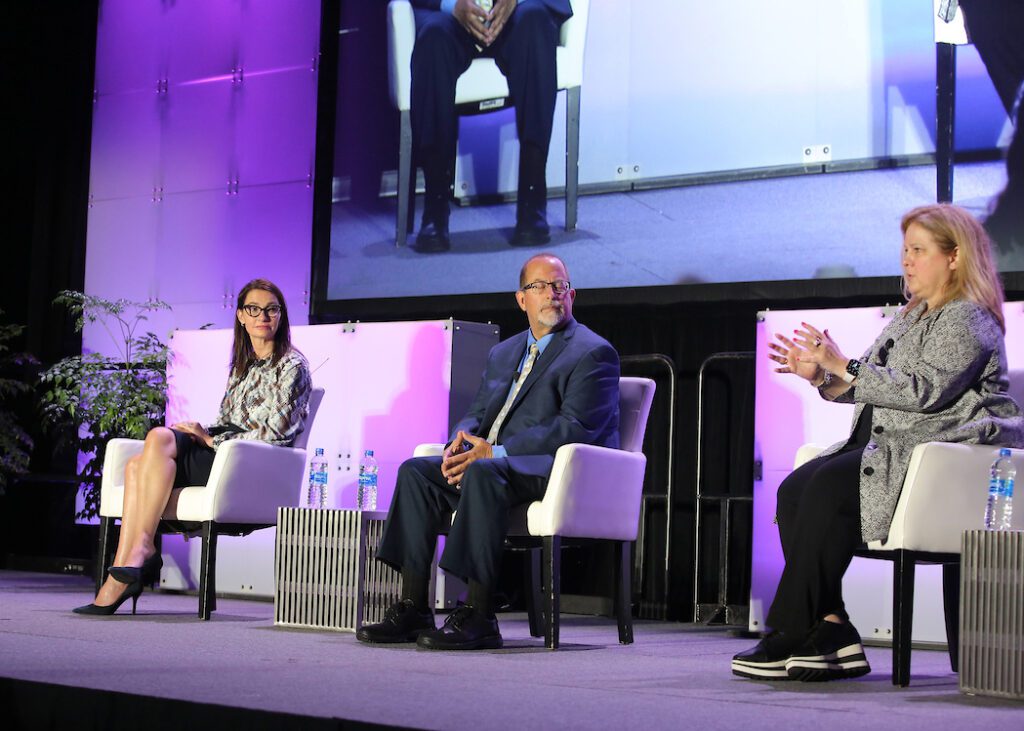The draft of the next Food and Drug Administration (FDA) user fee agreement currently making its way through Congress was developed with close cooperation of the biotech industry and offers a promise of a more collaborative process that supports meaningful innovation, experts at the BIO International Convention said yesterday.
Improvements proposed to the next iteration of the Prescription Drug User Fee Act (PDUFA) include an opportunity for developers of candidate drugs to hold more meetings with the FDA, an increase in staff that will build expertise at the FDA, a new rare disease program, and provisions to support diversity in clinical trials, according to a panel moderated by Khushboo Sharma, Chief of Staff and Senior Vice President at BIO.
Potential problems with “PDUFA VII” include changes to the FDA’s Accelerated Approval pathway, panelists said.
Created by Congress in 1992, the PDUFA sets the fees that the FDA charges companies seeking approval for their new drug candidates and establishes the guidelines for the approval process. It is renewed and updated every five years. The latest version, PDUFA VII, must be passed by September of this year to ensure the FDA can continue to operate. The House passed its version of PDUFA VII, and the Senate HELP Committee on Tuesday approved their version for full Senate consideration.
‘Productive conversation’
Yesterday’s panel included Cartier Esham, the Chief Science Officer of BIO, who is a veteran of the PDUFA negotiation process. As the representative of BIO, the world’s largest trade association of drug makers and other biotech firms, Esham plays an important role in developing the PDUFA proposal with the FDA and supporting its passage in Congress.
Esham said she was pleased to see that the latest round of discussions with the FDA showed the regulator understands the needs of the industry and wants to encourage innovative development of new drugs.
When it came to new proposals, “our list and the FDA’s list were 90% aligned, and that made for productive conversation,” Esham said.
Other panelists agreed the PDUFA VII negotiations with the FDA seemed positive.
“I think the longer I work in the regulatory space and meet with the agency time and time again, I’m impressed with the fact that they want the same things we do,” said Bill Rote, Senior Vice President of Research and Development at Travere Therapeutics.
More meetings, more FDA staff
One of the positive developments that Rote seemed particularly pleased with is an increase in the number of official meetings that drug makers hold with FDA staff when establishing the framework of the approval process and establishing endpoints for clinical trials for each drug candidate.
The increase in meetings was also seen as a positive development by Christi Shaw, CEO of Kite Pharma, a Gilead Company, as was the addition of more than 150 expert employees to the FDA’s Center for Biologics Evaluation and Research (CBER). Shaw’s firm develops cancer treatments that have achieved impressive results by reengineering each individual patients’ T cells. She said she was pleased that the regulator would be adding expertise in the complex new field of gene therapy.
“The new changes in PDUFA will really help ensure that regulatory authorities have the same knowledge that we do,” Shaw said.
Other positive developments that the panelists saw include a new pilot program to support the development of treatments for rare diseases and provisions aimed at increasing the diversity of clinical trials.
Esham noted that, during COVID-19 vaccine clinical trials, the regulator made innovations in using digital technology to allow remote trials. She said there are plans to use these techniques as a tool to involve members of previously marginalized communities in upcoming clinical trials, so these trials can include a diverse population that is more representative of the real population.
Accelerated Approval under fire
Other changes being considered for PDUFA VII have come from legislators who want to alter the FDA’s Accelerated Approval pathway for drugs that treat serious conditions for which no effective treatments exist. Drug makers can gain earlier approval for innovative, potentially life-saving drugs by achieving a biomarker assumed to indicate efficacy. There have been moves to limit this pathway, apparently on the assumption that it will save costs.
Esham maintained that invalid claims of cost-savings were politically motivated, that medical innovation would suffer if the Accelerated Approval pathway is restricted, and that political posturing around the issue must be countered with facts.
“The real outcome needs to be explained,” she said. “It can’t be acceptable to speak untruth to truth.”
She added that many of our medical advances have been supported by this pathway.
“How we’re treating cancer now is the result of Accelerated Approval,” Esham said.




